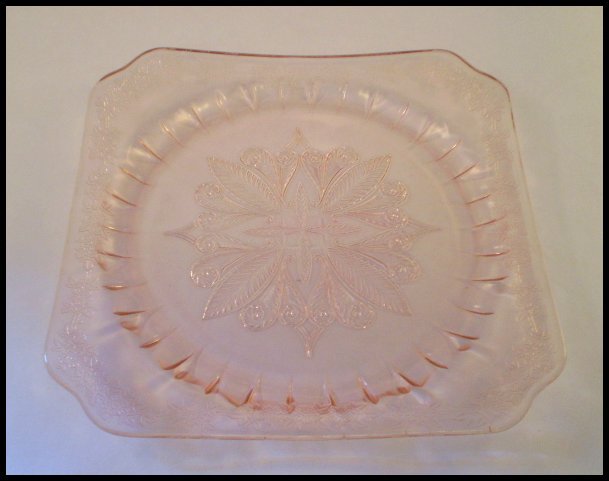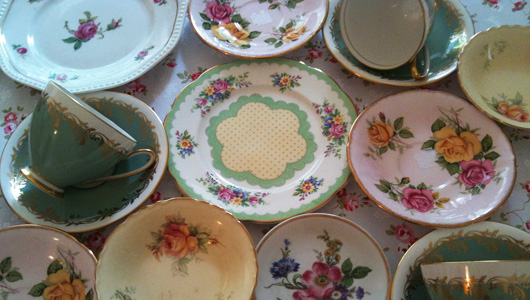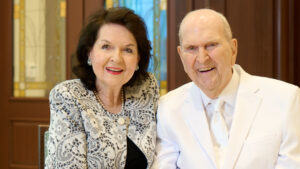
How to be Comfortable Not Knowing
The square-shaped dinner plate was special; it was made of pink glass with ornate flowers etched in the center and around the edges. The glass was a bit cloudy, showing its wear, but I loved it.
My mother is a dish-collector of sorts. Due to the large size of our family and her limited budget, her treasure hunts mainly consisted of browsing the neighborhood yard sales. There wasn’t a matching set of dishes in our cupboard but rather a collection of others’ surplus that became my mother’s gems.

One evening a close friend stopped by while we were eating dinner. He noted the pink plate and mentioned that it was valuable, and I shouldn’t be eating on it. And with that, my days of elegant dining ended.
After a careful washing, my dish was placed in the china cabinet with others deserving such honor. My mother took our friend’s proclamation at face value; the dish was far too precious to be used as a child’s dinner plate.
I can’t say I ever felt the same way about our friend. At dinner as I looked down at a plate that was not as lovely as the one to which I was accustomed, I resented the unsolicited comments on the value of our dinnerware. Looking at the plate in the china cabinet didn’t give me nearly the same pleasure as actually using it had.
About ten years ago my mother gave me the pink plate. “Here,” she said, “I saved this for you.” For the first time as an adult, I closely inspected the beloved plate. There were no markings identifying a manufacturer, which would aid in revealing its origins.
“So,” I asked my mother, “Why did our friend think this plate was so valuable?” She responded by describing features with which I was already familiar: “It is made of pink glass, and it is etched with those pretty flowers.”
With the tools available to me on the Internet, I decided to do a little research of my own. After checking several sources, I found I could purchase a set of five new dishes pretty much identical to the one I now housed in my cupboard for about ten dollars. The dish had intrinsic value, but its monetary value was nominal.
My mother had taken her friend’s declaration without entertaining an ounce of skepticism despite the fact he had no special training in evaluating the quality of dinnerware. She accepted what she heard as truth simply because it had been uttered, was plausible, and was even enticing. Perhaps the dish really was worth a bit of money.
Accepting Truth
A bit of skepticism is not a bad thing. After all, it is through questioning that the greatest discoveries are often made. Earnest truth seeking often encourages us to question that which we are told, which results in acquiring more complete and accurate information. It is unfortunate our society often conditions us to do the opposite.
Instilled at a young age to accept words spoken from those with the stamp of authority, we become accustomed to generally trusting that which others promote as truth. This authority is often established by a cursory examination of the fact giver’s credentials, such as age, profession, personal relationship, and ecclesiastical position.
This is not to say that our society has conditioned us to be consistently duped. Most justifiably consider a textbook a more accurate source of information than a grocery store tabloid magazine. But how many times have we unquestionably taken as truth the word of tour guides—certainly they have been briefed; accepted some gossip about a neighbor—after all their husbands work together; or a lecture in a Social Studies class—that master’s degree in history must account for something. It seems the bar for establishing a source of authority may be too low at times.
This social conditioning is especially detrimental with the advent of the Internet. Anyone can say anything at any time, but it doesn’t mean it is true. And with a click of the mouse, that information is made available to the world. The more the information is accessed, the more credence is attributed to it, creating what I refer to as the “Search Engine Fallacy.” A source is assumed authoritative simply because it has been frequently viewed.

Wisdom from Antiquity
There is an oft-repeated quote by Aristotle declaring: “It is the mark of an educated mind to be able to entertain a thought without accepting it.” In our quest for truth, it may be wise to ponder an idea without immediately accepting it. Instead weigh the facts carefully before making a decision and explore the reasoning behind a conclusion.
The flip side of this statement is true as well. It is important to consider an opinion before dismissing it entirely. Even arguments that result in faulty conclusions usually contain some bit of truth. One may entertain a thought that is alien to one’s normal way of thinking and after careful study and contemplation find it worthy of embracing.
This quote urges truth seekers to approach ideas with an open mind and weigh their merits carefully through study and examination; trying best to understand the concepts, but in the end, there is no need to agree with them.
Authentic vs. Counterfeit
This quote, which is easily found on the Internet, has been used in numerous blogs, college papers, and inspirational speeches over the years. A simple search on a popular Internet engine will result in hundreds of hits. It is a great quote: pithy, thought provoking, and easily understood. But I am not confident Aristotle actually coined the phrase. In fact, I am pretty sure he did not; if Aristotle always wrote so clearly, philosophy classes might be more popular.
The closest reference to a quote by Aristotle resembling this familiar rendition is found in his book Nicomachean Ethics: “It is the mark of an educated man to look for precision in each class of things just so far as the nature of the subject admits; it is evidently equally foolish to accept probable reasoning from a mathematician and to demand from a rhetorician scientific proofs.”

The essence of the quote is similar to its twentieth-century update, but the subtle differences impart nuances of meaning much deeper than its counterfeit cousin. Both quotes are worthy of contemplation, but only one is authentic and is in truth the voice of Aristotle.
Comparing the two quotes brings forth meaning in the authentic that is lost in the condensation. Aristotle urges one to “look for precision in each class of things just so far as the nature of the subject admits.” Constraints such as lack of historical data and insufficiencies in scientific knowledge limit our ability to determine the nature of truth, but these resources and others ought to be exhausted before accepting the accuracy of any conclusions.
Accepting Uncertainty and Determining Truth
But unless a thing is witnessed, can its reality ever be established with certainty? And if another has not had that same witness, can they assuredly take another’s word as a witness?
Aristotle brings up a second point that addresses these questions of uncertainty and where to turn for resolution: “it is evidently equally foolish to accept probable reasoning from a mathematician and to demand from a rhetorician scientific proofs.”
Similarly, those things that are historical are best obtained from personally studying history and the work of historians; those things that are spiritual are best obtained through spiritual means, whether that be through study of secular and religious sources, prayer, spiritual gifts, or slowly over time.

Truth seekers will undoubtedly encounter information with which they are either unfamiliar or uncomfortable. I encourage them to test Aristotle’s authentic dictate. For those things which are disconcerting, study them out “with precision . . . so far as the nature of the subject admits,” and only after doing so, make a decision whether to accept or reject them as truth.
When we accept as truth that which is proposed by another without seeking a knowledge of that truth ourselves, we not only risk exiling a cherished dish to the china cabinet but also perpetuating falsehoods by relying on words simply put forth rather than words that represent truth.









